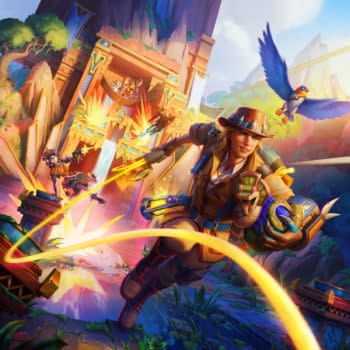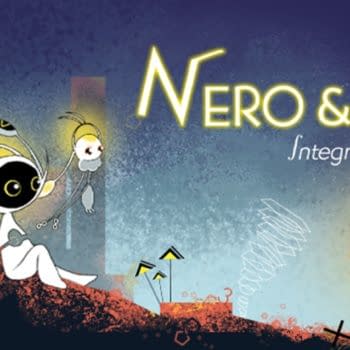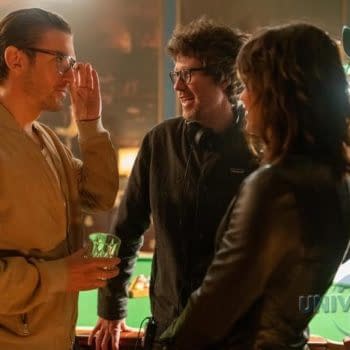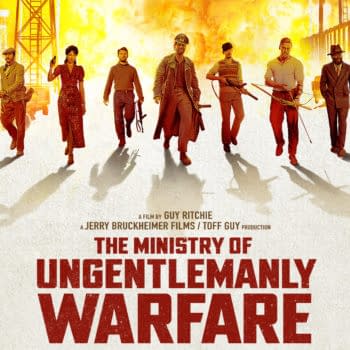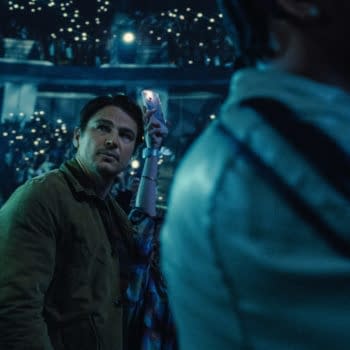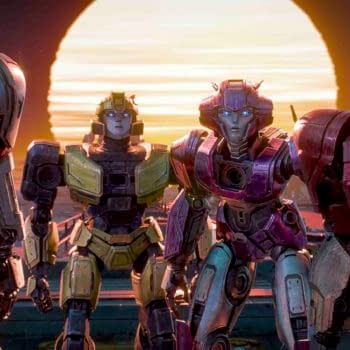Posted in: Games, Movies, Recent Updates, Video Games | Tagged: Alex Riviere, audio design, Captain America: Sentinel of Liberty, Clayton Tapp, Eden Morrison, entertainment, Final Fantasy XIV, Game Audio Lab, Orb Soundwerx, Seek, video games
Hitting The Right Beat – Talking With Three Audio Designers In The Game Industry
By Phil Harris
Whilst artists, game designers and coders are almost always part of the in-house team in videogames development the role of the audio designer, creating in game sounds and music, is often hired to fit the specific job he games studio are requiring. When you consider how important audio is in creating the videogame experience the audio designers are often missed out in any discussion of videogames.
There are many reasons why audio design does not sit comfortably within an individual company but this allows the companies and individuals the opportunity to expand their portfolios widely as they deal with a significant number of different requests, covering the many genres that games relate to.
To give a taste of what is involved we talked to Clayton Tapp from US based Orb Soundwerx, Alex Riviere from China-based Game Audio Lab and Eden Morrison, an independent audio designer in the UK.
Phil Harris: The importance of game audio is often understated. Do you feel there is a solid way to push this important medium forward and make the gamers more aware of it?

Additionally, there are currently soundtracks being released for independent projects prior to the release of the game. In this way, the music is helping to market the game. I've always thought that a game is fun because of three elements that live in harmony: Art, Mechanics, Audio. Without quality in each area, a game feels like it's missing something. I hope that my peers will share this view.

There are also two types of game audio approach: Console & PC game audio is generally to create an immersive and exiting experience to the gamers (also depends of the games' style of course), while mobile games are more about supporting the general game mood and create exciting feedback to the players (specially on touch screen devices).
I won't say game audio is understated for the Console & PC gamers, because I think good sound design works should not be noticed by the audience (same as in a movie for example). If the game audio is noticed by players, it is in most case because there are mistakes or glitches, and those will distract them from the immersive experience that game audio is supposed to create.
Generally speaking, the most important point is that developers and publishers understand the importance of having good audio in their games. Being based in China, we are trying to push local developers and gamers' understanding of game audio by producing "behind the scenes" videos and case studies on our website, with general techniques and thoughts about game audio cases.

Gamers respond well when a score is good and it can be a big draw for some people (try and imagine Hotline Miami being as successful as it was without its score), and I think it's more a case of trying to persuade developers to really push for excellence in audio and then by the time it gets to the gamers they will have high expectations. Unfortunately this stuff mainly addresses music as people seem to notice sound design so much less (unless something has gone drastically wrong), so no idea on that front unfortunately.
PH: Do you feel that in-house audio design is easier than working for hire and what are the relative merits of both types of design?
AR: It's two totally different things.
Being a game audio outsourcing company, our role is to jump quickly and in most case at the last minute in a project. We need to understand the game style and needs very fast, produce efficiently to respect budgets, deadlines and milestones. We usually ask a lot of questions to the developers during the first phase of pre-production, in order to have a clear visibility of the game and understand every aspects, including how the sound will be implemented in the game.
An in-house audio designer will not necessarily produce sound himself. He will work on the project during the entire development process, have a clear view of the game, prepare the audio design list, including assets production and implementation. He's the one that will manage the relationship with the contractor or outsourcing company if any. He's also the one that work closely with programmers to develops tools within the engine or middleware, and implement the sound in the game.
CT: We operate remotely via Skype/phone/email to ensure that our creative visions are aligned with that of our client's. While it's not always possible, we attempt to get involved in the development process as early as we can. This ensures that we are able to provide the same attention and workflow that an in-house sound designer does.
While our team members have also had experience working in-house, we believe that with the right amount of cooperation, that there should be no difference between the two.
EM: So, big caveat to what I'm about to say, I've not (yet) worked in-house at an actual game studio. However I have worked on projects at university from inception to completion and, from a creative point of view, this 'in-house' approach was considerably more satisfying. I think that it's important to ensure that every individual on your team be it art, design, code or sound should be on the same page creatively if you're going to make a really excellent product. Getting creative minds together to collaborate will always (in my opinion) create a more satisfying and cohesive whole both for the creators and the audience.
Having said that, I can see that, given the small scope of many modern games (especially in the mobile space), it might not be cost effective to have an audio person on the team for the entire duration of the project, so I understand why companies don't do that. Although I definitely feel that many companies don't make the most of the individuals they are contracting in. If someone is rushed in on the last couple of weeks in the project to match up some music and sounds to some visuals you somewhat miss the chance to have the collaboration which (in my opinion) is what makes games so great.
PH: How can clients assist you when requesting audio assets and do you ever feel restricted by these requests?
EM: I like as much information and media as possible to get as good an idea as possible about what the client is working towards. If you have a build? Send it. If you have art assets? Send them. Design document? Send it. Mood boards? Send them. Send me literally everything that you can, it all goes towards getting your creative vision from your head into reality.
Be clear and concise about what you want. If you aren't sure what you want then discuss that with me, chances are that I know more about sound stuff than the average artist or designer, so if you' hire to get me in to make your game sound great, use my full capacity and expertise. Every sound person I've met so far in this industry has been incredibly talented, use those talents to their full.
AR: By providing the maximum information and contents about the game. If we can get access to the game itself, that's great, but we still need clear description of any sound needed, how it will be integrated in the game, and if possible get access to videos for sound that are linked with animations; if not, artworks help a lot as well. Another very important aspect is to outline very clearly those information and data so anyone can understand these needs by having a quick look to the design documents.
The best situation for us is to provide a design document for the developer to fill in. After receiving it back, we will ask them the missing information we're looking for. It happened that we received too much information and data before the production, which took us even more time to sort out and understand than producing the audio itself… By using our own documents, anybody in our team can understand the needs of a game very fast.
CT: When a client is requesting our services, we ask that they provide us with a detailed asset list outlining the requirements of the project, with any additional information that they believe is important. From there we open up a casual conversation regarding creative direction/workflow/cost/etc.
Every project is different and so there is no strict set of rules for this process. First, and most importantly, we ensure that we understand the direction of the project and what we can offer to enhance the game. All other specifics are handled by strong communication and cooperation.
PH: You have all worked on different projects which of these are you most proud of and why?
AR: The first one that comes to my mind is Final Fantasy XIV, because it has been our first AAA game experience and our first voice dubbing project in Chinese. Also because it has been a wonderful collaboration with two other great sound houses, Formosa Interactive and SIDE UK.
If I can add another one, I'll say "Master of Meteor Blades" (in Chinese "新流星搜剑录"), which is a Chinese Martial Arts MMO fighting game. This was basically our first project in development at Game Audio Lab, and we worked closely with the game developer during more than a year, producing thousands of game audio assets and spending hours of playing the game in their office to give them inputs and feedback on the integration.

David says that it was absolute pleasure working with Marvel/Disney on this project. His epic compositions on this OST speaks volumes when considering the talent our team has to offer.

PH: As the technology improves, how do you see audio in games developing?
CT: As game engines evolve, so will game audio. With recent upgrades to Unity and middleware like Fmod and Wwise we are seeing that evolution take place. I'm truly blessed to exist in a time where things are only getting better for us and technology is developing at such a rapid pace. It's exciting! Additionally, binaural audio in VR/AR is becoming more popular and there are new applications emerging that will expand our abilities even further.
AR: Audio is better and better in the games, generally due to improvement of game engines and middleware.
The tools to create the audio contents are improving as well, but the ones to integrate the sound in the games are the ones that improve the fastest, and probably the most important ones at this stage of the industry.
Mobile games are improving as well, engine as Unity can be super powerful if you have the right people to develop tools dedicated to the audio.
The future will be without limitation, and we'll soon be able to control every aspect of the in-game sound mixing, which we already have in linear production (movies, trailers, etc.).
EM: To be honest, I think with some of the amazing tools available at the moment in terms of middleware (FMOD and WWise to be specific) there is so much that can be done even with the current level of technology that I daren't even speculate on what would come next.
PH: What would be your dream audio job or request?
AR: I have two: first would be to work on a game with a realistic & cinematographic approach (e.g. Last of Us) where the music, sound effects, voice acting and implementation play a key role in the immersive experience of the game.
Another dream audio job would be kind of the opposite: to create a sound experience from scratch, on a game that does not have any similarities with the real world, a game more based on the player experience and the poetic beauty of the soundscape (e.g. "Journey").
CT: My dream audio job would allow me to work along-side the client throughout the design process. To make suggestions regarding the audio that would enhance the project along the way. To design elements that would make the audio interactive during gameplay. The structure and design of this project would rely on the Art/Mechanics/Audio equally without ever separating those elements.
EM: I think anything where I get to collaborate in a tightly knit team with really talented people on a project that I'm fully invested in is the dream for me. I'd also really love to work more with live session musicians or (maybe some day, fingers crossed!) a full orchestra.
PH: Clayton, the US is often seen as the hub of the videogame market due to the number of AAA studios that exist there. Do you see this as an advantage, does it lead to an added diversity of work from other studios and how do you see your market developing.
CT: We have had great success in the US market and we definitely see this as an advantage. However, being that we operate remotely and that we are a multi-national audio production studio, our clients come from many different areas of the world. It's definitely a privilege to be connected to the Hollywood network, but we tend to view the global game market as a whole.
We intend on growing with the future of gaming. As we expand our client base and open up our doors to new developers, we can be certain that the future of Orb Soundwerx will be a bright one.
PH: Alex, we see a number of sound design companies working out of China, what are the relative benefits of the location, do you see the industry as a whole growing there and how do you plan to take advantage of this?
AR: Well, the first benefit of the location is the amount of games produced internally in China every year. The industry is growing, but moving and changing very fast, and we always have to adapt. Game Audio Lab is about a year and a half old, and the main purpose of the company was originally to help local developers with their game audio, focusing principally on MMO games.
This past 6 months, the market has drastically changed, and all local developers have been focused almost exclusively on mobile games, which have made quite a big change for us, as we had to produce small amount of assets per game, but switching from one game to another couple of time per day, while MMOs was more about producing a lot of sounds for one game, with a production time of 6 months to a year.
The other purpose was to help the game audio industry to grow in China. There is almost no school and training for sound engineers/designers here, and it is quite difficult to find experienced Chinese game audio people. It is a very young and new industry that we'd like to help growing by training and hiring more talents.
Finally, this past October, Xbox One was coming to PR China, being the first gaming and entertainment console approved for sale in China in 14 years. PS4 might follow early next year. Again, that means a big change of market, a great opening and opportunities, and a yet incalculable growth of the local industry.
How do we plan to take advantage of this? Well, we're the only foreign owned sound studio dedicated exclusively to video-games in the entire China Mainland yet, this create opportunities for sure, but also closes doors sometimes.
PH: Eden, as someone who is just starting in the audio design business you must be delighted to have projects already under your belt. What are the next steps in your development?
Yeah, what can I say, I'm really happy and I feel truly privileged to have gotten to work on the projects I've worked on, especially as the level of talent and skill in the audio sector is so high. In terms of what's next? Well, depending on a bunch of variables, I might be moving into an in-house position down south at a fairly new company that calls Dundee it's spiritual home, can't really speak to details, but if everything works out it pretty much matches my dream job description. Other than that, just working hard on some new content for a couple of titles and trying to get my foot wedged further in the door in the freelancing game.
Phil Harris (@PhilipGHarris) is a games developer who is currently working with One Thumb Mobile on their MMORPG Celtic Heroes. He also writes for Pixels for Breakfast.












